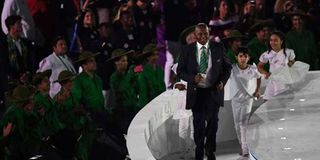Kip Keino: I leave Nock healthy and ready for young leaders

Kipchoge Keino takes part in the opening ceremony of the Rio 2016 Olympic Games at the Maracana Stadium in Rio de Janeiro on August 5, 2016. AFP PHOTO | WILLIAM WEST
What you need to know:
- Kipchoge said that he managed to steer Kenyan sports to greater heights since taking over from his beleaguered predecessor Charles Mukora at a turbulent period in 1999.
Outgoing National Olympic Committee of Kenya President Kipchoge Keino on Thursday took time to reflect on what he described as some of his best moments while serving Kenyan sports for close to two decades.
Kipchoge said that he managed to steer Kenyan sports to greater heights since taking over from his beleaguered predecessor Charles Mukora at a turbulent period in 1999.
During the intervening period, Kipchoge said the country managed to win 100 medals at the Olympic Games, 220 medals at the Commonwealth Games and 379 medals at other global competitions.
Kipchoge explained that he is happy to leave behind the Nock building at Upper Hill, Nairobi, which is in its final stages of construction.
FINANCIAL STABILITY
“The building will go a long way in boosting the organisation’s financial stability and ensuring our federations have offices to serve sports.
“That is testament to our industry and focused leadership,” said Kipchoge in a statement, adding that it has come a time when he has to exit the stage and allow another generation to step on.
“I took over as head of Nock at a very turbulent period of our sport, coming after one of the most successful and hardworking coaches during the Kenya golden era, Charles Mukora, unceremoniously exited from Nock and the International Olympic Committee (IOC),” explained Kipchoge.
Mukora was suspended from the IOC and later resigned from IOC body after being found guilty of inappropriately receiving money from the Salt Lake City bid committee for the 2002 Winter Olympic Games.
Kipchoge said that they managed to achieve many milestones in local and international sports owing to the support from his colleagues in Nock.
“Our officials were elected to many continental and international sports federations and confederations,” said Kipchoge, the legendary athlete whose enviable cabinet includes gold medals in the 1968 and 1972 Olympics, 1966 and 1970 Commonwealth Games and 1965 All Africa Games, and an array of silver and bronze medals.
“Life has many stages, from childhood, adolescence, adulthood and sunset stages or senior citizenship. It is with the same with sports competition and leadership,” said Kipchoge.
“I have done it all, I have seen it all. I have done what I was able to do, by the grace of our creator, the Lord, who has enabled me to achieve all this for myself and my country.”
Kipchoge thanked his family for bearing with him during his long spells of foreign travel.
He also paid tribute to his colleagues in Nock, Anoca and IOC and the governments of the late Jomo Kenyatta, Daniel arap Moi, Mwai Kibaki/Raila Odinga and Uhuru Kenyatta for the unwavering support they gave him during his time as an athlete and an official.
“The Presidents and Prime Minister Odinga all supported me and my projects and I thank them all most profusely,” said Kipchoge, who also paid tribute to IOC Presidents, starting with the late Juan Antonio Samaranch, who inducted him into the prestigious position of IOC membership, Jacques Rogge and the current President Thomas Bach.
Kipchoge wished the incoming office bearers best of luck, but advise them to be aware of the high responsibilities that come along with and the cartels in sports leadership who may derail them by serving their selfish interests.
“It is an office of high integrity and high expectations by the Olympic movement,” said Kipchoge.





